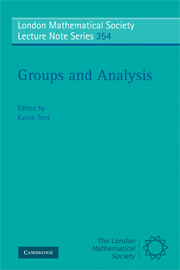Book contents
- Frontmatter
- Contents
- Preface
- List of speakers and talks
- 1 Harmonic analysis on compact symmetric spaces
- 2 Weyl, eigenfunction expansions, symmetric spaces
- 3 Weyl's work on singular Sturm–Liouville operators
- 4 From Weyl quantization to modern algebraic index theory
- 5 Sharp spectral inequalities for the Heisenberg Laplacian
- 6 Equidistribution for quadratic differentials
- 7 Weyl's law in the theory of automorphic forms
- 8 Weyl's Lemma, one of many
- 9 Analysis on foliated spaces and arithmetic geometry
- 10 Reciprocity algebras and branching
- 11 Character formulae from Hermann Weyl to the present
- 12 The Classification of affine buildings
- 13 Emmy Noether and Hermann Weyl
4 - From Weyl quantization to modern algebraic index theory
Published online by Cambridge University Press: 12 May 2010
- Frontmatter
- Contents
- Preface
- List of speakers and talks
- 1 Harmonic analysis on compact symmetric spaces
- 2 Weyl, eigenfunction expansions, symmetric spaces
- 3 Weyl's work on singular Sturm–Liouville operators
- 4 From Weyl quantization to modern algebraic index theory
- 5 Sharp spectral inequalities for the Heisenberg Laplacian
- 6 Equidistribution for quadratic differentials
- 7 Weyl's law in the theory of automorphic forms
- 8 Weyl's Lemma, one of many
- 9 Analysis on foliated spaces and arithmetic geometry
- 10 Reciprocity algebras and branching
- 11 Character formulae from Hermann Weyl to the present
- 12 The Classification of affine buildings
- 13 Emmy Noether and Hermann Weyl
Summary
Introduction
One of the most influencial contributions of Hermann Weyl to mathematical physics has been his paper Gruppentheorie und Quantenmechanik [We27] from 1927 and its extended version, the book [We28] which was published a year later and carries the same title. The main topic of this part of Hermann Weyl's work is the mathematics of quantum mechanics. After the fundamental papers by Heisenberg and Schrödinger on the foundations of quantum mechanics had appeared in the twenties of the last century this was the central question studied in mathematical physics at that time and which to a certain degree still is present in all attempts to construct mathematically rigorous theories unifying quantum mechanics and general realtivity.
In his article Gruppentheorie und Quantenmechanik, Hermann Weyl essentially introduced two novel aspects to the mathematics of quantum mechanics, namely the following:
(i) The representation theory of (compact) Lie groups on Hilbert spaces was applied to mathematically determine atomic spectra.
(ii) A conceptually clear quantization method was proposed which associates quantum mechanical operators to classical observables which mathematically are represented by appropriate functions of the space and momentum variables. Nowadays, this quantization scheme is named after his inventor Weyl quantization.
In this paper I will elaborate only on the second aspect, since the representation theory of compact Lie groups has already been covered in detail in other contributions to these proceedings.
- Type
- Chapter
- Information
- Groups and AnalysisThe Legacy of Hermann Weyl, pp. 84 - 99Publisher: Cambridge University PressPrint publication year: 2008



